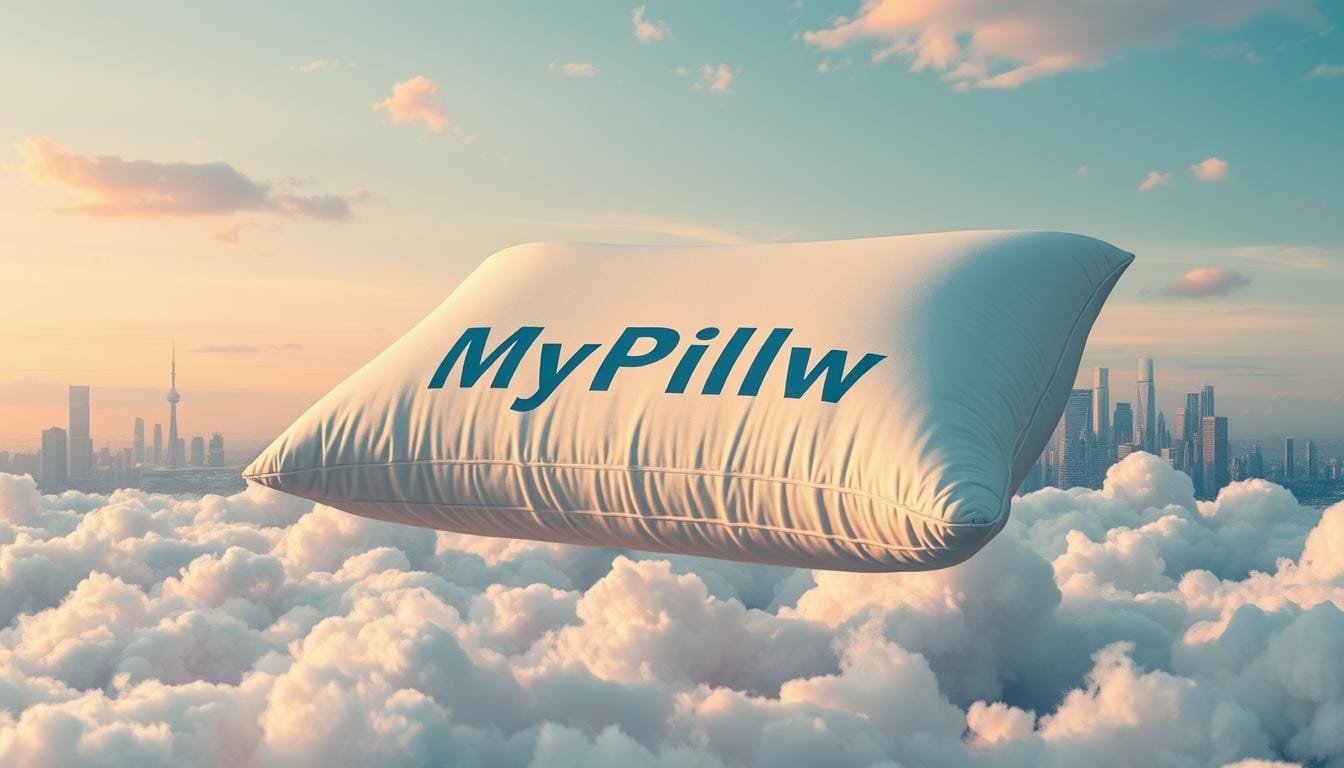Recent news has stirred up talk about MyPillow going out of business. Everyone from customers to experts is wondering about the company’s future. With growing financial troubles and legal battles, it’s crucial to explore if MyPillow might really be shutting down, or if they’re just facing tough times.
Our research shows MyPillow owes a large sum of $564,151.39 to Extend, Inc. They also missed payments adding up to $110,799.22 by April. There’s even talk of eviction for not paying $200,000 in rent, showing the company might be in trouble.
Even so, CEO Mike Lindell stands strong. He’s sure that pillow sales will continue and is ready to face what he calls an “all-out attack” on MyPillow. Yet, the loss of lawyers over unpaid bills and stopping ads on Fox News could be a big problem for him. This might lead to a debt of $7.8 million for Lindell.
We’re looking closely at these issues to figure out what they mean for the well-known brand. Especially, how MyPillow’s lawsuit against cash advance companies could affect their money situation and tell us more about the future of Lindell’s business.
Key Takeaways
- MyPillow’s financial difficulties see outstanding invoices and missed payments accumulating rapidly.
- The company grapples with evictions and breach of contractual agreements with partners.
- Mike Lindell’s enduring personal investment offers optimistic counter-points to closure rumors.
- Legal predicaments and shifting advertising prospects impact MyPillow’s operational stability.
- The resilience of pillow sales offers a silver lining, amidst a storm of legal and financial challenges.
- Company statements assert sales continuity despite “an all-out attack” on the brand and its CEO.
- The potential influence of Lindell’s political activities on the pillow company’s future remains a relevant factor.
Understanding MyPillow’s Financial Woes
Recently, MyPillow has faced tough times with money and legal issues. These problems have stressed the company a lot. They’ve had to deal with eviction for not paying rent and losing key stores that used to sell their products. This has shaken up the business for MyPillow, which used to be doing really well.
Eviction from Shakopee Warehouse
The eviction of MyPillow’s Shakopee warehouse was a big deal. It owed over $200,000 in back rent. Before being kicked out, the company got several warnings. This trouble hurt MyPillow’s ability to store and send out goods, making things hard at an important time.
Owed Rent and Legal Troubles
MyPillow’s problems include owing nearly $600,000 to Lifetime Funding. That’s not all. It’s also facing serious court cases that could cost a lot of money. Check out this lawsuit here. Because its credit is cut, MyPillow can’t move money around easily.
Impact of Lost Retail Partnerships
Losing stores like Walmart and Bed Bath & Beyond was a big blow to MyPillow. This loss meant fewer people saw and bought their pillows. So, MyPillow had to change its plans. They started looking for new ways to sell their products, not just in stores.
Let’s take a close look at MyPillow’s money troubles and court cases. These issues show big challenges for the company. They point to a need for MyPillow to think over its plans and how it operates.
| Issue | Amount | Details |
|---|---|---|
| Legal Settlement | $5 million | Arbitration award against MyPillow for disproved voter fraud claims. |
| Unpaid Bills | $800,000 | DHL lawsuit over unpaid logistics services. |
| Defamation Lawsuits | $1.3 billion | Dominion Voting Systems seeking damages from MyPillow CEO Mike Lindell for defamation. |
These events are more than just bad luck. They signal a big shift for MyPillow. It’s clear that being creative, willing to change, and maybe changing what’s most important could be key for its future success.
CEO Mike Lindell’s Fight to Save MyPillow
CEO Mike Lindell is leading MyPillow’s fight to stay afloat amid legal and financial issues. His strategy involves using his own money and changing the company’s direction to ensure its future. This shows his deep commitment to MyPillow’s success.
Legal Battles and Financial Struggles
MyPillow is facing big legal problems, with billion-dollar lawsuits from companies like Dominion Voting Systems and Smartmatic. These lawsuits threaten the company’s stability. The costs for these legal battles are sky-high, making a strong defense crucial.
The company’s money problems are serious too. Reports say MyPillow is behind on warehouse rent, and American Express cut their credit line massively. Losing major retailers has also hit their earnings hard. These issues add to the company’s financial stress.
Lindell’s Personal Commitment
Lindell is doing all he can to save MyPillow, including using his own money. He’s selling personal assets to pay off debts and support the company. This shows his huge dedication to MyPillow, its team, and the community relying on it.
Shift in Business Focus
MyPillow is changing its strategy because of these legal problems and market changes. The company is focusing more on selling directly to customers instead of through big stores. This new approach is meant to overcome the loss of retailer partnerships and strengthen the business.
New products and market expansion are also part of MyPillow’s new strategy. These steps aim to grow the company’s market presence despite tough competition. Lindell’s strong commitment and these strategic changes are key for MyPillow’s path forward. They offer a plan for overcoming current challenges and hopeful growth.
Financial Challenges and the Merchant Cash Advance
MyPillow has faced deep MyPillow financial debt mainly because they relied on merchant cash advances. These tools are akin to business payday loans and have put the company in a tight spot. They show the big issues with merchant cash advance practices.
Debt with Lifetime Funding
At first, teaming up with Lifetime Funding seemed like a great move for MyPillow to get past some money issues. Yet, the situation quickly got worse. The conditions of the advances didn’t match well with how much cash the company had available.
MyPillow took loans from several places, facing a tough challenge. One such loan was $1.6 million with a staggering 409% interest per year from another lender. This trapped them in a cycle of debt, hard to escape because they had to pay back money every day.
The Nature of Merchant Cash Advances
Merchant cash advances (MCAs) aren’t loans but advances on a business’s future sales. They can quickly provide cash which attracts businesses in trouble; but, they come with very high costs and tough payback terms. This has led to problems with debt and MyPillow legal controversies.

Lawsuits and Controversies
The legal problems for MyPillow got worse with several merchant cash advance lawsuits. They claimed that the advance terms were set up to make default almost certain, benefitting the lender. A major lawsuit against Cobalt Funding Solutions highlights this issue. Cobalt offered to buy future sales from MyPillow at rates far above legal limits. MyPillow argued these were illegal, usurious loans.
| Financial Engagement | Amount | Annual Interest Rate | Outcome |
|---|---|---|---|
| Initial MCA with Lifetime Funding | $1.6 million | 409% | Legal Dispute |
| Debt with Cobalt Funding Solutions | $1.5 million | 409% | Lawsuit for Usury |
| Cumulative Advances (2022) | $10 million | Variable | Multiple Defaults |
Dealing with merchant cash advance agreements, MyPillow’s story sheds light on the risks and the need for careful decision-making in financial matters.
Is MyPillow Going Out of Business?
Rumors have been swirling about MyPillow closing and bankruptcy. We’re taking a close look at what’s really happening with this once-popular company. In recent years, MyPillow faced many challenges that made people question its future. It’s important to closely look at the events that led to these concerns.
In 2017, MyPillow’s customer relations took a hit, leading to a severe drop in its Better Business Bureau rating. Customers were frequently complaining. This was the beginning of a difficult time for the company’s image and trust with customers. As problems grew, big stores like Walmart stopped carrying MyPillow products by 2021. They said it was because of market research and less demand, avoiding the political reasons often mentioned in the news.
By July 2023, things looked even worse for MyPillow. They started to auction their equipment and lease their manufacturing space. This showed they were reducing their size. They also faced financial problems, needing $600,000 to keep going. This was due to legal costs, less credit, and many stores not selling their products anymore.
The company had a loan that required them to pay $16,800 every day. This could mean an interest rate over 400% with fees. MyPillow’s lawyers called this “loan sharking” in legal terms. They used the RICO Act to fight the loan terms, saying it was a part of illegal activities.

| Year | Issue | Impact |
|---|---|---|
| 2017 | BBB rating downgrade | Consumer trust decline |
| 2021 | Product phase-out by major retailers | Reduced market presence |
| 2023 | Asset liquidation and urgent cash need | Operational contraction & severe financial strain |
Given these events, the MyPillow closure rumors and bankruptcy speculation seem more realistic. Mike Lindell’s hope for reorienting the company might be optimistic. But, we’ll have to wait and see what the future holds.
The Bigger Picture: Lindell’s Political Activities and Their Impact
Mike Lindell’s leap into politics has sparked a lot of talk. This move caused a strong reaction against MyPillow in society and business. As MyPillow’s CEO, Lindell’s firm political views and support for conspiracy theories grabbed public interest. They also led to big changes in how his company is seen and operates.
Lindell’s Political Involvement
Mike Lindell is known for strongly supporting ex-President Trump and claiming election fraud. These actions put him in the national spotlight. Many experts have debunked his claims, leading to lawsuits like the $1.3 billion one from Dominion Voting Systems. Lindell’s dive into politics has affected MyPillow, changing how people see the brand and its business.
Impact on MyPillow’s Business
The political actions of MyPillow’s CEO have seriously hurt the business. After Lindell’s comments and the events of January 6, stores like Kohl’s stopped selling MyPillow products. They said the brand did not fit with their values or what their customers wanted. This hurt MyPillow’s sales a lot, especially since the company used to rely on these big stores to sell its items.

| Event | Impact on MyPillow |
|---|---|
| Lawsuit by Dominion Voting Systems | Potential financial liabilities and legal fees |
| Retailers dropping MyPillow products | Significant loss in retail distribution channels |
| Public political stance | Brand image shift, affecting consumer perception and loyalty |
Watching how things unfold for Mike Lindell and MyPillow shows the big effects of mixing business with politics. The challenges MyPillow faces highlight a key message for business leaders. It’s about the risks of taking public political stands and their impact on business and partnerships.
Conclusion
MyPillow is facing tough times. It lost a lot of money when big stores stopped selling its stuff. Now, it has to find a way to make up for losing over $100 million.
Stores like Menards and Fleet Farm still sell MyPillow products. But, getting back to where it was before is going to be really hard.
The company had to sell off a lot of its gear. This shows they’re trying to save money because they owe a lot in rent. They’re also fighting a huge legal battle.
Mike Lindell is spending a lot of his own money on politics. This could change how people see MyPillow or decide to buy it.
Ad problems and a big money loss in court make things even harder for MyPillow. It needs smart planning and quick changes to get through these tough times.
FAQ
Is MyPillow going out of business amidst recent challenges?
Despite rumors, MyPillow isn’t closing down. CEO Mike Lindell says the company is just changing its plans. They’re adapting to new financial and legal realities.
What led to MyPillow’s eviction from the Shakopee warehouse?
MyPillow was evicted because they didn’t pay over 0,000 in rent. They received four notices before the eviction. This is part of downsizing due to losing big retailers.
How have the lost retail partnerships impacted MyPillow?
Losing retailers hit MyPillow hard. They sold off store equipment and changed their sales strategy. Now, they’re trying new ways to stay afloat during tough times.
What are the details of Mike Lindell’s legal battles and financial struggles?
Mike Lindell faces billion-dollar lawsuits from Dominion Voting Systems and Smartmatic. MyPillow also has debts, like one to Lifetime Funding. Despite losing retailer support, Lindell is committed to pushing MyPillow through using different business approaches.
How is MyPillow addressing its significant financial debt?
MyPillow is dealing with big debts from cash advances. They’re suing some loan companies, saying those loans were unfair. These legal fights add to MyPillow’s money troubles.
Are Mike Lindell’s political activities affecting MyPillow’s business?
Yes, Lindell’s political comments have hurt MyPillow. His stance on the 2020 election cost the company some big retailers. This has led to lost sales and harmed the brand’s image.
What is the current state of MyPillow’s lawsuit with Dominion Voting Systems?
MyPillow and Mike Lindell are locked in a big lawsuit with Dominion Voting Systems. They’re suing for defamation. This is one of several legal challenges the company faces.
How has the reduction of MyPillow’s credit line affected the company?
The smaller credit line is tough for MyPillow. But Lindell is using his own money to help. He’s changing how they handle money to deal with this credit squeeze.
